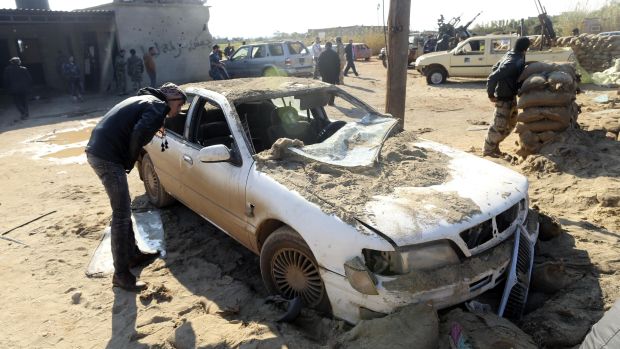Libya differs from Egypt and Tunisia. Libya has a complicated background from more than 40 years under Gaddafi’s rule, and this has a direct impact on the present state of the country.
Libya’s situation calls primarily, for all political forces in spite of their disagreements and conflicts, to come to a compromise. But the inability on the part of some political forces to separate the Libyan issue from their own political agendas has made this difficult. The situation in neighboring countries, including Egypt and Tunisia, also make reconciliation a difficult task.
The ouster of former Egyptian Muslim Brotherhood President Mohamed Mursi and the subsequent designation of the Muslim Brotherhood as a terrorist organization have had a clear impact on the Libyan Muslim Brotherhood and its Justice and Development Party.
This is dangerous for Libya. Brotherhood members have begun to think that what is now happening in Egypt following the dismissal of Mohamed Mursi will continue. For this reason, they offered aid and consulted with the leaders of the Brotherhood in Egypt, including the Supreme Guide. This, however, was discovered by the Libyan people, and public support for the Libyan Brotherhood among the Libyan public fell by around 60 or 70 percent.
As a result, the Brotherhood in Libya has changed tactics, most recently by nominating certain delegates to the Constituent Assembly, which is charged with drafting the constitution. It has been observed that they nominated delegates who were not clearly affiliated with the Muslim Brotherhood or the Justice and Development Party, in order to guarantee a role in drafting the constitution and advance their agenda.
The events that transpired under the rule of the Brotherhood and Mursi in Egypt, despite differing circumstances in the two countries, served as a warning to all in Libya. Libyans are now preparing to isolate the Brotherhood and prevent them from accessing the levers of power within the bodies charged with rebuilding the state. The Brotherhood has retaliated by using of force and oppressing those with whom they disagree.
Liberals consider this step an important one in the transition from revolution to state. On the other hand, political forces rightly look to Egypt as they try to move forward. The media widely has widely called for Prime Minister Ali Zeidan to visit Cairo with a retinue of businessmen and military officials in order to sign a Memorandum of Understanding between the two countries. The memorandum would advance the interests of all parties and focus on the issue of border protection.
Nevertheless, the Libyan situation remains unique when compared to that of both Egypt and Tunisia. The former regime in Libya left behind an array of obstacles that have frustrated a quick transformation after the revolution. The obstacles that we are currently trying to overcome do not exist in other countries. They include the fact that the Gaddafi regime fomented tribal feuds and granted tribes a central role in politics during his reign. This was combined with an absence of true political parties and national labor laws for decades. The Political Parties Law that was implemented by the former National Transitional Council after the revolution of February 17, 2011, was awful, in that it forced nascent political parties to compete and operate within a tribal framework.
There is another issue that has become somewhat of a quagmire, especially because of the actions of remnants of the former regime and some tribes: the issue is federalization. It was not proposed at the national level. It is possible that the decentralization of political power could aid in development and competition, but unfortunately it was brought up in a very violent manner that led to schisms. Libya’s 40 years of isolation, which sets it apart from both Egypt and Tunisia, has left many scars across the country, along which rifts are beginning to surface thanks to the proliferation of weapons amongst so-called revolutionaries. These armed groups pose a real problem by refusing to join the military or the police. They also refuse to order their ranks by appointing colonels or captains, and they are affiliated with the former regime. This is a major obstacle because you cannot build an army or police force with people that do not have expertise, experience, training or any other helpful characteristics. Thus the Libyan case is different from those of Tunisia and Egypt. Nearly three years after the overthrow of the former regime, Libya has so far failed to establish a strong army or police force. However, hope still rests on the election of the Constituent Assembly, which will soon draft a new constitution for the country.
The counterpoint to this article can be read here.
